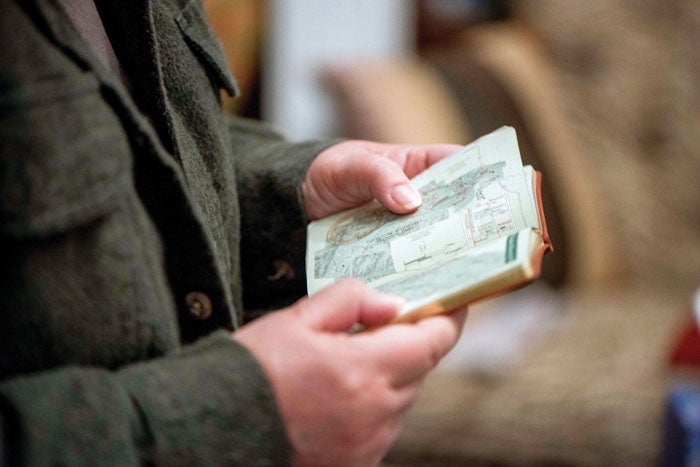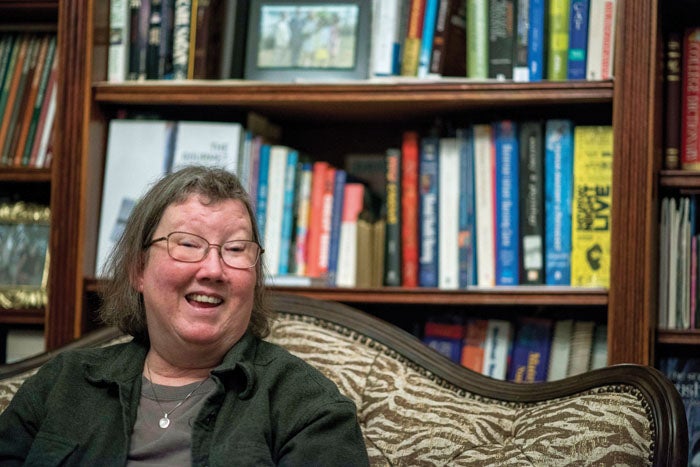‘Make the most of every day,’ cancer patient advises
Published 6:22 pm Tuesday, January 22, 2019
By Maggie Blackwell
For the Salisbury Post
SALISBURY — If anyone had a legitimate right to a full-fledged pity party, Sue Carroll did.
She lost her husband, Russ, to cancer on Christmas Eve 2017 after 16 months of illness.
But a pity party is nowhere in her plans. In April, she was working with a grief counselor when she shared that she was having difficulty remembering words and names.
“Is this a symptom of the grief?” she asked.
The counselor told her unfortunately, no, and Sue headed to her local emergency room to be checked. They ran a few tests and transferred her immediately to Levine Hospital in Charlotte.
“You think of an ER taking four, five hours,” Carroll says, “but the whole thing took just an hour and a half.”
“I don’t remember her name,” Carroll says, “but a young woman, maybe a physician’s assistant, was talking to me in my hospital room about what was going on. Buried in her dialogue, she said, ‘We have found cancer.’ That’s how I found out.”
“My in-laws stayed the evening,” she says, “and friends and family filtered in and out throughout the next day or two. I was the least shocked. A brain tumor does something to you to calm you down. I’m normally calm, but the tumor has made me especially calm. It’s almost like your brain secretes something to calm you down.”
The next day, doctors removed a 2-inch tumor from her brain.
“I found out later my surgeon is very well respected in his field. I was quite lucky to get him.”
The surgery took an hour and a half. Her surgeon was unsure of the results until the second MRI came back. He’d removed 98 percent.
She had visited her grief counselor on Monday and gone to the emergency room. She had brain surgery on Tuesday, went to a step-down unit on Wednesday, and went home on Thursday.
Her recovery period was four to six weeks, then she had radiation and chemotherapy for 40 days, with chemo every day and radiation on weekdays.
One of the first things doctors do with cancer, she says, is to remove your anti-inflammatory medication. Carroll suffers from arthritis.
“The nights were the hardest,” she recalls. “I was allowed to take Tylenol, but its effect was limited. Today I’m finally allowed to take one Alleve.”
Her shoulder and hip are worst, she says, and once the Alleve wears off, “It’s not pretty.”
Carroll’s a big believer in supporting local businesses. When Small Business Saturday came around in December, she bought a Jelly Cat stuffed animal from Caniche to help with the long nights. She holds him close and he brings her comfort.
“After two or three weeks I thought, ‘Wait a minute, here. I need to pass this on.’ It’s comforted me so much, I want to give others the same feeling. So I contacted the nurse at my oncologist’s office and asked how many glioblastoma patients Dr. Haggstrom had.
“I figured maybe eight, 10 patients,” she says, “But the total was 30. So I approached Caniche and Lora Belle Baby and bought 15 from each. Thank goodness, both stores gave me a discount, which I really appreciated.”
“We carried them in at my next appointment. By the end of the day, the nurse had already given one away. Two people got really bad news about their conditions, and they got unicorns. She sent me a picture of a man getting an infusion, holding his bear.”
“The nurse was so happy when I said I wanted to provide gifts for my fellow patients. They call me the angel in the office. When it turned out to be 30 patients instead of eight, I’m thankful I had the means to provide them.”
“Russ died on Dec. 24. I retired on Feb. 9 and put the house on the market the same day.”
She laughs.
“I did all the things you’re not supposed to do when someone dies.”
Her home was on 6 and a half acres with more than 2 acres of grass. Russ’ son Jon had mowed for her when Russ was ill, but she wanted to be out before mowing season began again.
She sold the home shortly before her cancer diagnosis.
After the surgery, Carroll visited several places in Charlotte to be near her treatment. A home for people being treated for cancer didn’t feel right; at 62, Carroll was about 20 years younger than the other youngest person.
Another apartment near the hospital turned out to be “too hip” for her comfort.
Finally, Carroll began talking to nephew Jim Behmer about moving to Salisbury. He had room in his home for her and his wife, Kritsana Singha, was supportive.
“Jim was careful about not trying to make me feel obligated to come. Novant has services in Salisbury associated with Levine, so I could do them here. I only go to Levine to visit my oncologist. Both Jim and Kritsana said they are glad to have me here.
“I’m glad when we’re here and we do things together, and I’m glad when I can go out and they have time alone.”
Russ and Sue had just visited 59 national parks before his illness. Sue calls it the adventure of a lifetime.
“I had been working at my company, SAS, for 25 years and had a generous amount of vacation each year. Russ was a contractor and could select times he would be unavailable. We scheduled our long trips at the ends of contracts.”
On their first trip, they found a leather “passport book” at Acadia National Park. They bought it and used it as their guide to visiting the parks.
Sue would often print graphics of parks and circle several in one geographic sector to plan a trip. As they visited the parks, each had a little station where they could use a rubber stamp to make a mark in their passport.
“Our inspiration was the desire to see the USA, and the list of 59 parks in our passport was doable. We wanted to take this journey while we were in good physical and financial shape, which meant taking the trips during vacations. I encourage everyone to do fun things on your bucket list while you are working; you get no guarantees if you put them off.”
Today, Carroll has just completed her sixth round of chemo. She gets five days of treatments every 28 days, and she’s halfway through a year-long cycle. Her doctors have mentioned a two- to three-year span.
“They’re developing new treatments all the time,” she said.
She spends her time working on her national parks scrapbooks, having lunch with friends, and working out at the YMCA.
“I have to be careful,” she laughs. “Often I’m tempted to come out with inappropriate remarks about death, but I have to remember others are not as comfortable with it as I am. I’m wanting to talk about death – I’m OK with it, but other people are not.”
She has guidance for friends of cancer patients.
“When I talk about my diagnosis, people often say I’ll be the one to beat it. I wish they wouldn’t say that. My counselor has advised to let them know they’re requiring me to defend the negative.”
Her advice for others: “Live day to day. Make the most of every day. You get no guarantees. None of us do. And visit the national parks. They’re beautiful. They’re the best part of what we have as a nation. They’re just gorgeous – the red rocks in Utah, the volcanic craters in Hawaii, the exquisite scenery in Alaska, the walking trails in Acadia.
“Do it all now while you can. I’m happy to have those memories.”






